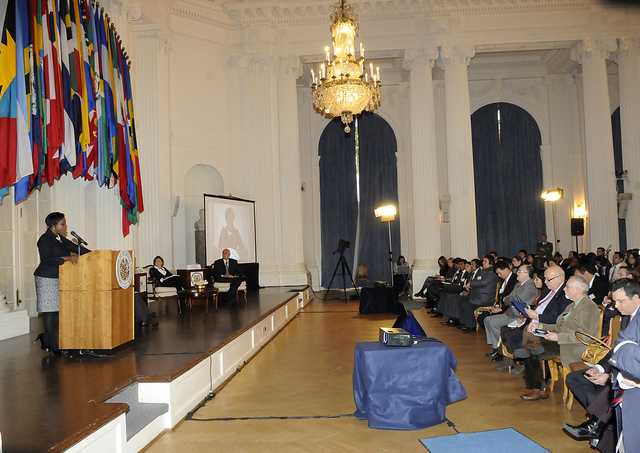|
Last Updated: Feb 6, 2017 - 2:32:04 PM |

Date: February 08, 2012
Place: Washington, DC
Credit: Patricia Leiva/OAS
|
The
40th Policy Round Table of the Organization of American States (OAS)
analyzed the issue of public security in the western hemisphere, to be
one of the axes for discussion during the Sixth Summit of the Americas,
to be held in April 13 and 14 in Cartagena de Indias, Colombia.
Participants
in the event, titled, “The Road to Cartagena: Hemispheric Cooperation
to Strengthen Public Security,” included Anthony T. Bryan, senior fellow
at the Institute of International Relations, University of West Indies,
St. Augustine, Trinidad and Tobago; María Victoria Llorente, Executive
Director, Fundación Ideas para la Paz, Colombia; and Rubén Aguilar,
journalist and Press Secretary for former President Vicente Fox, Mexico.
It was moderated by Richard Feinberg, Professor of international
political economy at the University of California, San Diego.
The
OAS Secretary General, José Miguel Insulza, recalled at the event’s
opening that the issue of public security has grown in importance in
recent years, not only in multilateral forums, but in the societies of
the countries of the continent, and he highlighted, in this context, the
growing influence of organized crime, which he called “a real industry
of crime that threatens our democracies.”
“The demand by the
public for this issue to be faced has been growing in our region,” he
said. “This is an issue of the greatest importance, and the government
of Colombia, which is charged with the organization of this Summit, with
good reason selected it among the agenda items the region must face to
make progress towards prosperity.”
The head of the hemispheric
Organization also highlighted the need to handle “concrete proposals” on
this issue. “What the Summit wants is to obtain from you concrete
proposals on cooperation between the countries to be able to make
progress towards finding a solution to this problem,” he added.
Anthony
T. Bryan talked specifically about the issue of public security in the
Caribbean, warning that without the implementation of adequate measures,
“It won’t be long before the Caribbean is deeply enmeshed in what you
see going on in Central America.”
Bryan highlighted the growing
drug production in the Caribbean, though he specified that it is
fundamentally of marijuana. “Despite the gravity of the situation as it
seems to us, I do not classify any of our countries as being
narcostates,” he stressed, adding that, “They are not there yet and
hopefully they won’t ever be there.”
María Victoria Llorente
highlighted the importance of International cooperation to face tretas
to public security, though not just any type of collaboration. “What is
important is to ask ourselves about what experiences we are exchanging:
are these experiences being correctly evaluated? Do we know that this or
that program really works or doesn’t work?” she asked. “We have many
intuitions in the region on what works and doesn’t work, but little is
based on reality,” she warned.
Also, she remarked on the
relevance of the role of intelligence services in the fight against
crime and collaboration between countries. “I think there is an
important state of affairs that is settling in Ameripol, where the issue
of cooperation and intelligence is not only a technical matter, but one
of trust,” she said. “Mechanisms such as Ameripol generate the kind of
trust that is required for the exchange to begin to flow, and,
necessarily, if there is an important lesson from Colombia in the fight
against organized crime in recent years it has to do with the role of
intelligence,” she said.
Rubén Aguilar said security is a public
good charged to the State, “not only to the government but to civil
society.” In this sense, he called for focusing efforts on the violence
that affects the population every day.
“What violence are we
talking about? Ninety-five percent of violence in Mexico is common
jurisdiction—theft on the street, in a car, express kidnappings,” that
is, “acts of violence that truly affect society.” “It seems therefore
that what appears to be the bulk of the violence is not in the press, it
is not either in the discussions between public officials or in the
discussion between political parties,” he added.
Also, he called
for adopting a new paradigm to face drug trafficking, including the
possibility of legalizing marijuana. “The great priority from my point
of view is to question the paradigm, to think in a different way on how
to face the problem,” he said.
The event was moderated by Richard
Feinberg, who highlighted the progress achieved in the process of the
Summits of the Americas, such as the measuring of results, independent
monitoring and evaluation, and participation by civil society, among
others. “We are building, we are moving forward.”
In closing
remarks, Ambassador Luis Alfonso Hoyos Aristizábal, Representative of
Colombia to the OAS, highlighted as representative of the host country
of the next Summit of the Americas, that these forums must be enriched
“more and more,” “because here we have witnessed, as the Secretary
General said, that this is an issue of utmost concern to the citizens of
the continent.” “And, in second place,” he continued, “the importance
for this discussion to be not only among governments or academicians,
but that it be held more and more in the public forum and civil society
and political debate, because that is the way to appropriate it
collectively and create a much broader reflection, including the
opinion, interests and ideas of a much broader public.”
For more information, please visit the OAS Website at www.oas.org.

© Copyright 2012 by thebahamasweekly.com
Top of Page
|
